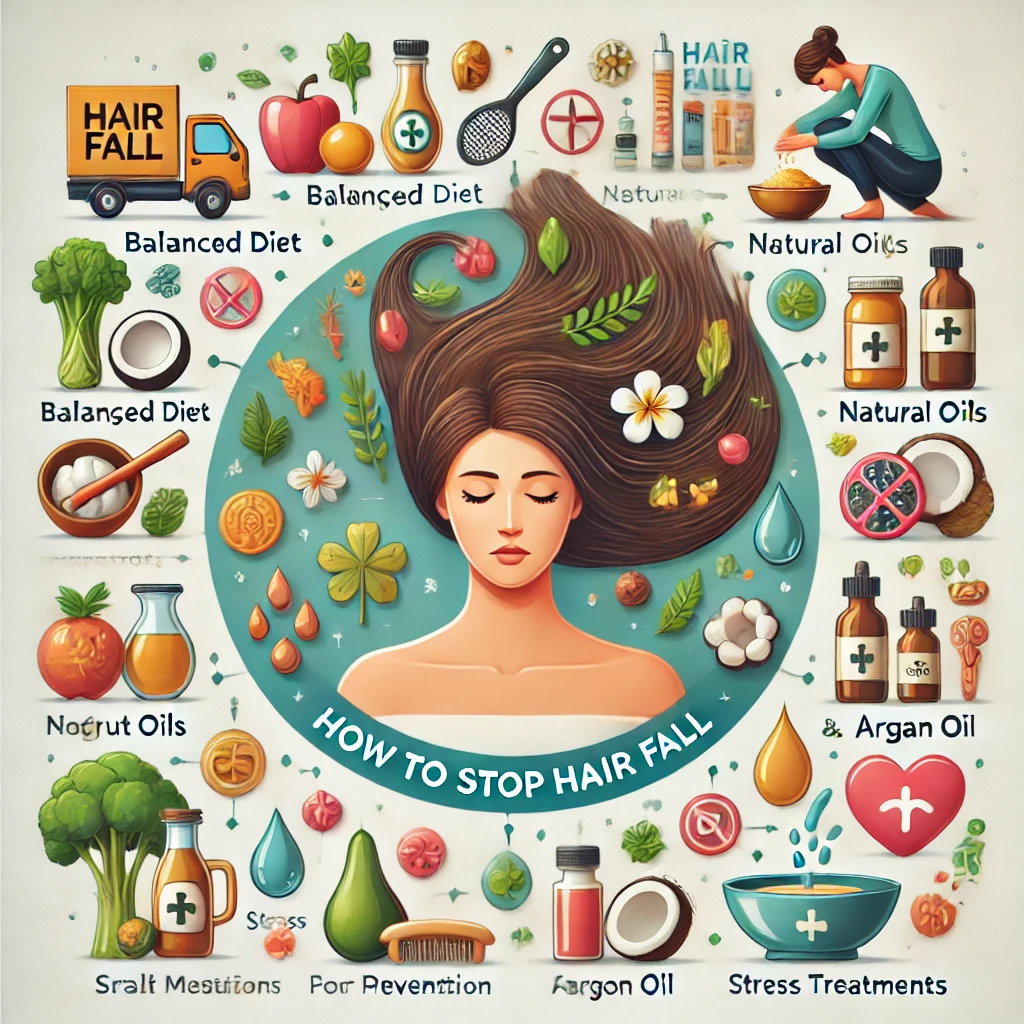
Hair fall is a common concern that affects millions of people worldwide, regardless of age or gender. While losing 50-100 strands of hair a day is normal, excessive hair fall can be distressing and may indicate underlying health issues. In this comprehensive blog, we’ll dive deep into what hair fall is, its causes, natural ways to control it, and the best treatments available.
What is Hair Fall?
Hair fall, or hair loss, occurs when the natural cycle of hair growth is disrupted. The hair growth cycle consists of three phases:
- Anagen (Growth Phase): Hair grows actively for 2-7 years.
- Catagen (Transition Phase): Hair stops growing and detaches from the follicle (2-3 weeks).
- Telogen (Resting Phase): Hair falls out, and the follicle rests before starting a new cycle (2-3 months).
When this cycle is disrupted, hair falls out faster than it can grow, leading to thinning or bald patches.
Common Causes of Hair Fall
Understanding the root cause of hair fall is crucial for effective treatment. Here are some common causes:
1. Genetics (Androgenetic Alopecia)
Hereditary hair loss, also known as male or female pattern baldness, is the most common cause. It’s linked to the hormone dihydrotestosterone (DHT), which shrinks hair follicles over time.
2. Hormonal Imbalances
Conditions like pregnancy, menopause, thyroid disorders, or polycystic ovary syndrome (PCOS) can disrupt hormone levels, leading to hair fall.
3. Nutritional Deficiencies
A lack of essential nutrients like iron, zinc, vitamin D, and biotin can weaken hair and cause it to fall out.
4. Stress and Anxiety
Physical or emotional stress can trigger telogen effluvium, a condition where hair prematurely enters the resting phase and falls out.
5. Scalp Infections
Fungal infections like ringworm or bacterial infections can damage hair follicles and cause hair loss.
6. Poor Hair Care Habits
Overuse of heat styling tools, harsh chemicals, tight hairstyles, or improper washing can damage hair and lead to breakage.
7. Medical Conditions and Treatments
Autoimmune diseases like alopecia areata, chronic illnesses, or treatments like chemotherapy can cause significant hair loss.
How to Control Hair Fall Naturally
While medical treatments are available, natural remedies can be effective in reducing hair fall and promoting healthy hair growth. Here are some proven methods:
1. Balanced Diet
Your hair needs proper nutrition to stay healthy. Include these foods in your diet:
- Protein: Eggs, fish, lean meat, and legumes (hair is made of keratin, a protein).
- Iron: Spinach, lentils, and red meat (prevents anemia-related hair loss).
- Omega-3 Fatty Acids: Walnuts, flaxseeds, and fatty fish (nourish the scalp).
- Vitamins: Citrus fruits, carrots, and nuts (rich in vitamins A, C, and E).
2. Scalp Massage
Regular scalp massages improve blood circulation, strengthen hair roots, and reduce stress. Use warm coconut oil, almond oil, or castor oil for added benefits.
3. Aloe Vera
Aloe vera soothes the scalp, reduces dandruff, and promotes hair growth. Apply fresh aloe vera gel to your scalp, leave it for 30 minutes, and rinse.
4. Onion Juice
Onion juice is rich in sulfur, which boosts collagen production and strengthens hair. Apply onion juice to your scalp, leave it for 15-20 minutes, and wash it off.
5. Green Tea
Green tea is packed with antioxidants that stimulate hair follicles. Rinse your hair with cooled green tea or apply it directly to your scalp.
6. Avoid Harsh Chemicals
Switch to sulfate-free shampoos and conditioners. Avoid excessive heat styling and opt for natural hair care products.
7. Stay Hydrated
Dehydration can make hair dry and brittle. Drink at least 8-10 glasses of water daily to keep your hair hydrated.
8. Manage Stress
Practice stress-relief techniques like yoga, meditation, or deep breathing to reduce hair fall caused by stress.
Best Medicines and Treatments for Hair Fall
If natural remedies don’t yield results, consult a dermatologist for medical treatments. Here are some effective options:
1. Minoxidil (Rogaine)
Minoxidil is an FDA-approved topical treatment that stimulates hair growth and slows hair loss. It’s available over the counter and works for both men and women.
2. Finasteride (Propecia)
Finasteride is an oral prescription medication for men that reduces DHT levels, preventing further hair loss.
3. Platelet-Rich Plasma (PRP) Therapy
PRP therapy involves injecting your own blood plasma, rich in growth factors, into the scalp to stimulate hair growth.
4. Hair Transplant
For advanced hair loss, hair transplant surgery can restore hair by transplanting follicles from one part of the scalp to another.
5. Ketoconazole Shampoo
This medicated shampoo treats fungal infections and dandruff, which can contribute to hair fall.
Lifestyle Changes to Prevent Hair Fall
- Regular Exercise: Improves blood circulation and reduces stress.
- Proper Sleep: Aim for 7-8 hours of sleep to support overall health.
- Avoid Smoking: Smoking reduces blood flow to the scalp, weakening hair follicles.
- Limit Alcohol: Excessive alcohol can dehydrate the body and affect hair health.
When to See a Doctor
If you notice sudden or severe hair loss, bald patches, or scalp irritation, consult a dermatologist. Early diagnosis and treatment can prevent further damage.
Conclusion
Hair fall can be a challenging issue, but with the right knowledge and approach, it’s manageable. By addressing the root causes, adopting natural remedies, and seeking medical advice when needed, you can restore your hair’s health and confidence. Remember, healthy hair starts with a healthy lifestyle, so nourish your body, mind, and scalp for the best results.
Have you tried any of these remedies or treatments? Share your experiences and tips in the comments below!
